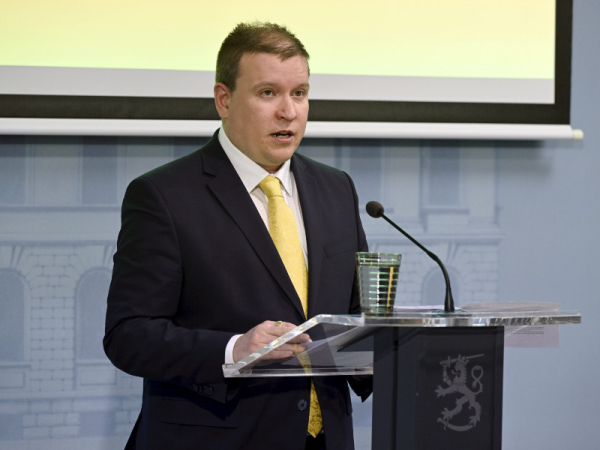
Minister of Foreign Trade and Development Ville Tavio (PS) shed light on cuts in development co-operation appropriations at a news conference held in Helsinki on Thursday, 18 January 2024. Tavio said the government is carrying out a necessary change in its approach to development co-operation, in an attempt to combine trade and development. (Antti Aimo-Koivisto – Lehtikuva)
- Next Article Li Andersson calls for sanctions on Israel, climate action in Helsinki Times interview
MINISTER of Foreign Trade and Development Ville Tavio (PS) on Thursday confirmed that the government will slash appropriations for development co-operation by more than a billion euros.
More than 500 million euros will be slashed from region and country-specific development co-operation by 2028, with the government discontinuing its programmes with Afghanistan, Kenya, Mozambique and Myanmar.
The government is shifting its approach to development co-operation out of necessity, according to Tavio.
“The operations will focus on combining trade and development, as well as on creating possibilities for Finnish value creation and expertise also in development policy,” he outlined at a news conference. “Kenya can be thought of as a good example of how a bilateral development co-operation relationship can serve as a basis for moving, through forms of development co-operation in the private sector, to trade relations that benefit Finnish companies.”
The government will also implement cuts to multilateral co-operation, humanitarian assistance and development-policy loans and investments. Funding for multilateral co-operation will be cut by 160 million euro and that for humanitarian assistance by 130 million euros by 2028. Development policy loans and investments, meanwhile, will be reduced by 60 million euros a year.
Tavio highlighted that the cuts have been designed in accordance with the government programme and existing commitments.
“It’s better to focus on clearly defined areas in development co-operation rather than to make equal cuts across the board,” he argued in a press release.
Ilmari Nalbantoglu, the director of advocacy at Fingo, stated to YLE on Thursday that the spending cuts are significant and unsurprising. What is positive, he added, is that the government has promised to discontinue the country-specific programmes in a controlled manner.
“This is a very good thing. If we pulled out of there, we’d only cause some harm,” he said.
Nalbantoglu did criticise the minister for placing such emphasis on trade relations, however, reminding that the principal goal of development co-operation is development rather than trade. Also Finland’s presence and opportunities to influence will diminish around the world as a result of the decisions.
“The primary benefit should be that we can promote development and get those in the most vulnerable position out of the most wretched position. That’s also how you can create a safe and stable world,” he reminded in an interview with the public broadcaster.
While the Afghanistan and Myanmar programmes will be discontinued due to lack of co-operation with the national administrations, the justification is not as convincing for the programmes with Kenya and Mozambique, said Nalbantoglu. In Kenya, for example, development co-operation efforts have focused on reducing violence against girls and women.
“This isn’t something you could promote with corporate-level co-operation. Finland will no longer be able to promote women’s ability to move to decision-making roles in Mozambique or Kenyan youth’s ability to get to vocational education,” he said.
Tavio said the government will focus on building more strategic relationships with its key partners during this electoral term. Ukraine will be by far the largest partner in development co-operation, with the government sending 58 million euros annually to the country through a separate budgetary item.
Aleksi Teivainen – HT
- Next Article Li Andersson calls for sanctions on Israel, climate action in Helsinki Times interview
Source: www.helsinkitimes.fi
